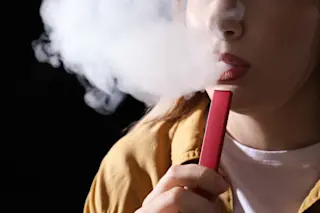Disposable e-cigarettes and vape pods are becoming increasingly popular thanks to their convenience. But beneath their cute packaging and fruity scent lies a troubling secret — high levels of lead and other cancer-causing hazardous materials.
A new study, published in ACS Central Science, revealed that disposable e-cigarettes are significantly more toxic than refillable e-cigarettes and traditional cigarettes. These new, disposable versions release toxic metals that, when inhaled, can increase the risk of cancer, respiratory disease, and nerve damage.
“Our study highlights the hidden risk of these new and popular disposable electronic cigarettes — with hazardous levels of neurotoxic lead and carcinogenic nickel and antimony — which stresses the need for urgency in enforcement,” said senior author Brett Poulin, an assistant professor in the UC Davis Department of Environmental Toxicology, in a press release. “These risks are not just worse than other e-cigarettes but worse in some cases than traditional cigarettes.”
Toxic Metals in E-Cigarettes
Electronic cigarettes and vape pods are made up of self-contained cartridges holding a battery, e-liquid, and a heating coil. Each of these distinct elements seems to contribute to the high levels of toxic metals present.
The team at UC Davis began their investigation into e-cigarettes after a vapor test revealed shocking results.
“When I first saw the lead concentrations, they were so high I thought our instrument was broken,” said first author Mark Salazar in the press release. “That sparked us into looking further into these disposables.”
After the first test, the team decided to analyze seven types of disposable smoking devices from three popular brands. They tested the presence of metal and metalloids in the devices by heating the internal liquid and simulating between 500 and 1,500 puffs per device.
The analysis yielded more concerning results. Along with the presence of lead, there were also high concentrations of antimony, chromium, and nickel. Additionally, the more puffs simulated on the devices, the higher the levels of metals increased. One of the popular disposable devices tested even released the same amount of lead in a single day as 20 packs of traditional cigarettes.
Read More: Safer Than Smoking? Vaping Tied to Alarming Rise in COPD Cases
Where Do The Toxic Metals Come From?
To figure out where the toxic metals were coming from, scientists disassembled the devices to take a closer look. They found that many components of the disposable e-cigarettes were leaching metals and metalloids.
“We found that these disposable devices have toxins already present in the e-liquid, or they’re leaching quite extensively from their components into e-liquids and ultimately transferred to the smoke,” said Salazar in the press release.
Parts made with leaded bronze alloy leached both nickel and lead into the e-liquid. There were also levels of antimony already present in the liquid. The heating coils released even more nickel into the devices.
Additional tests of the vapor of disposable e-cigarettes showed nickel and antimony levels surpassing the cancer risk limits. But cancer wasn’t the only health risk identified. Nickel and lead emissions blew past the expected limits, with the levels present putting daily users at risk of neurological damage and respiratory diseases.
A Call For Better E-Cigarette Regulations
Although they are illegal throughout much of the U.S., disposable e-cigarettes are still easily accessible. They are also trending and popular with many young people who are prone to lead exposure.
Because the e-cigarette industry is constantly growing, there have been very few studies on the health impacts of these devices. This lack of information puts consumers at risk and prevents proper regulations from being put in place.
Researchers hope this study will increase public concern around these devices and prompt lawmakers to more strictly enforce rules and regulations for their use.
This article is not offering medical advice and should be used for informational purposes only.
Read More: Is Vaping Healthier Than Smoking? Here's What One Lung Specialist Can Tell Us
Article Sources
Our writers at Discovermagazine.com use peer-reviewed studies and high-quality sources for our articles, and our editors review for scientific accuracy and editorial standards. Review the sources used below for this article:















